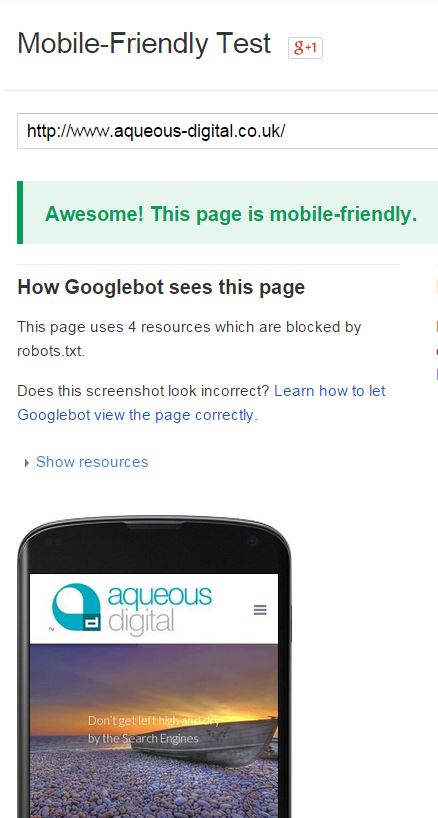Over the past couple of days there has been an enormous amount of additional content written about the upcoming change to the way Google ranks websites in mobile search. Much of what I have read adds little to the debate and in many cases it is so wrong it is dangerous.
As an example I had to comment yesterday on an article which said that “From April 21, websites not optimised for mobile phone or tablet use will be removed from the results of any search being made via a mobile device.” To be fair the author did subsequently change the wording when I pointed out that Google had said no such thing but it is a clear example of how a little knowledge is a dangerous thing.
This confusion has been fuelled even further by reports that a Google employee said at a recent conference in the USA that this update would be bigger than Panda and Penguin which of course was enough to set the hares coursing. Before you know it bloggers all over the place are writing that ‘the sky is falling’ and that the world as we know it will end on 21st April.

So let’s try and put some context on all of this and figure out what is likely to happen and what action needs to be taken.
The starting point is to decide how much of your organic search traffic initiates from mobile searches. You can find this in Google Analytics and the result might surprise you. In the case of our own website the figure is that less than 5% of all traffic is coming from mobile organic searches.
Bear in mind here that Google is NOT changing their normal desktop search results, only those for mobiles which means that we are only talking about searches which people make on a mobile for something other than your company name.
Fact number one, therefore, is that in the case of our website we are talking about less than 5% of our total traffic. On checking various non e-commerce client websites this figure stacks up rather well.
Ecommerce websites however, are far more variable with the range across all our clients being from 4% to 38% however given that many of them run PPC campaigns already then they are already mobile optimised.
The next myth to bust wide open and the subject of this post is what will Google rank better next month, great content or mobile optimised sites?
My personal view is that Google’s prime aim is to deliver the best search results to any query that is entered into it. At its heart, it is still a search engine or given the number of knowledge boxes it now presents, an answers engine.
No one has yet been able to accurately articulate what would happen if, for example, someone searched for a query on their mobile where the very best answer on the planet is on a non-responsive website. Would Google present the very best answer as the top result even though the site is non-responsive or would it put a mobile responsive website that does not answer the search query properly at the top of the search results?
I have yet to see a clear answer to this from anyone and I guess the reason they haven’t answered it is that it will be based on a huge range of criteria. Logically however the better user experience is to find the right answer to the search query even if it takes a bit of pinching and zooming.
The alternative argument however is that from a Google perspective mobile usability is a search quality issue. If Google users end up on a page that looks poor and/or fails to provide information in easy-to-view manner on their device, then that page is really not the best match despite having the best information*.
So Fact two is that there is no clear answer to this question right now. Anyone who tells you otherwise and isn’t a member of Google’s staff is probably guessing.
All of which leaves us with the $64,000 question of ‘what should I do right now?’ Well as Douglas Adams one so eloquently put it;

The very first thing you should do is to check how your site performs on Google’s Mobile Friendly Test as this is the benchmark against which you need to decide on action.
Remember that as we are talking exclusively about Google’s search results then it is irrelevant whether you think your site looks good or not; you are not the final arbiter in this, Google is. This tool will tell you whether you are mobile friendly or not.
If you find you are not then the best advice we can give to anyone is to talk to the person who built your website about changing this. In many cases, they will need to either add in a new CSS for mobile or in certain cases built a mobile version of your website to properly optimise the mobile browsing experience.
Please don’t expect them to do this work for free; they won’t.
If you no longer use a developer or have fallen out with them then there are plenty of providers out there who can help and we are just one of those.
Remember at all times that whilst we may be talking about just 5% of your traffic (not sales, turnover or profit, just traffic) there may be more reasons for doing this than just a commercial imperative.
For example, a properly optimised site will rank better in mobile search and that, of course, is a good thing. Five years ago very few people browsed on their mobiles, now most do. In another five years, we could all be using mobile devices instead of desktops. Making your website mobile user-friendly can only be a good thing.
Professionally your website sends a message about your company and you can control what that message is. Making sure it works across all devices and platforms helps you to connect with your customers.
And finally, whilst April 21st will see a shake-up in the mobile rankings, how long before Google decides that mobile usability is an essential for their overall rankings? Given the speed of change currently my guess is that it won’t take long.
As we wrote to clients last month, doing nothing is not an option. Take action over the next few months to upgrade your website and make the question we started with a moot point.
*Huge thanks to Keijo Kortelainen for providing the balance to my earlier arguments





